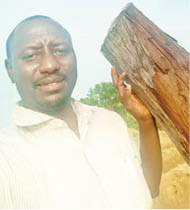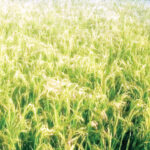Farmers in the six North East states of Adamawa, Borno, Yobe, Bauchi, Taraba and Gombe have said that they are perturbed by the current prolonged dry spell occasioned by hot dry weather which is threatening reduction in agricultural output over the coming months.
However, both traditional and modern weather experts observed that the atmospheric outlook showed that the season may likely record average rainfall, hence that the farmers should expect bumper harvest.
Many of the farmers have invested huge amounts of money on their fields hoping to reap the proceeds within a four to five-month period of rainfall, which mostly starts in June, every year.
But the farmers’ hope began to wane with the dry spell that dragged up to July ending – half the season – which saw virtually all the crops they had planted withering.
- Again, JAMB highest scorer, school get N3m cash rewards
- NGE institutes annual memorial lecture in honour of Jakande
Meanwhile, the Nigerian Meteorological Agency (NiMet) on January 25, released its 2023 Seasonal Climate Prediction (SCP) giving a general climatic and weather forecast advisory, and predicted the rainfall onset date for Borno and Yobe as early July.
The SCP reads in part: “The extreme Northern states are predicted to have onset between June and July, with the Northern fringes of Sokoto, Kebbi, Zamfara, Kano, Katsina, Jigawa, Yobe and Borno states predicted to likely have onset between 20th June and 7th July of 2023.”
Also, a 70-year-old local farmer, Mallam Baba, told Daily Trust on phone that his deep knowledge of predicting weather through natural signs for decades convinced him and others to embark on early planting.
Baba said, “It’s only God that’s perfect. So, even the NiMet can make wrong predictions.
“For us in the village, we use traditional knowledge in knowing when to start planting, because any farmer that has five to seven decades of experience has a good understanding of the weather and climate dynamics of his area.
“And this experience, being passed from generation to generation, mostly relies on the study of the weather based on wind direction, atmospheric temperature as felt by the body and phonological changes of some animals like insects, butterflies, birds and some plant species.
“I believe that even the so-called technology used for weather forecast relies on some of these signs.”
He, however, decried that the season this time around had betrayed the predictions of both traditional and modern weather experts and in turn caused irrecoverable losses to farmers in the region.
Our correspondent who interviewed some peasants on their field reports was told that many of them sold their livestock and other valuables and invested in the farmlands but that the crops withered due to the long seizure of rainfall.
In Yobe, Nuhu Mukaddas said the consequences of the dry spell had caused many farmers and pastoralists to lose their crops and livestock.
Mukaddas said, “Many people sold their livestock and invested the money into their farms, and all they invested went down the drain. The crops withered and we have no money to reinvest.
“A friend sold his ram that was priced N120,000 during Sallah at N50,000, paid for a harrow and planted corn and groundnut, but they have all withered and weeds took over the fields.
“This is just one of many farmers that refused to store grains in their homes to make this failed investment. Now the price of grains has skyrocketed.”
Another farmer, Sule, also shared a pathetic story of a pastoralist that lost about 10 cows on the outskirts of Damaturu.
Sule said, “A herder tended his herd into a guinea corn farm, where the crops had wilted. Unfortunately, some of them fed on the rotten cornstalk and instantly started dying. You know cows don’t eat it, but there were no shrubs for the cows to feed on.”
In Molai on the outskirts of Maiduguri, Aliyu Babagana explained that the prolonged dry spell had seriously affected him and other farmers, noting that early planting had not paid off this time around.
Babagana said, “Walk through all the farmlands; you need no one to tell you that farmers are in trouble; not only crops, but stubborn grasses have dried up. That’s why we resorted to special prayers in mosques and churches for God’s intervention.”
Abubakar Bakura also decried that his crops had dried up, while calling on people to mend their relationship with God.
He said, “My greatest fear is drought, especially now that we face a similar fate with Niger Republic. You know, both countries rely on each other when it comes to grains and livestock businesses. So, any food crisis in Niger will definitely affect Nigeria.
“Before this time, once people offered special prayers, it rained even before they returned home, but you’ll wonder what’s happening now. You will see clouds as if it will rain the next minute, but they will disappear.”
Similarly, in Diffa Province, Niger Republic, farmers, specifically in some border towns with Nigeria, expressed hopelessness over the situation.
Musa Abdullahi said, “Many farmers here are faced with exacerbating farming problems; that’s why we wouldn’t waste another effort sowing. Grasses have dried up at this time; what do we expect of crops?
“This season, the future of the rainfall has lots of uncertainties and many farmers here say they wouldn’t want to take risks.”
Abdullahi further said that for almost a month they had not recorded any rainfall until last Tuesday, noting that, “That is why no seed has so far germinated and the soil is even thirsty. We are actually witnessing a weird rainy season this time around.”
He added that the situation was the same in other major cities he had visited recently like Gigime, Boso, Kablewa, Jakori, Garin Wanzam, Kinchambi, Tumar and other provinces in the country.
‘Expect bumper harvest, rainfall proper this week’
Allaying the fear of the farmers, experts, both modern and traditional, said the season had given them signs of bountiful harvest and that steady rain would start falling within the week.
Professor Muhammad Waziri of the Department of Geography, University of Maiduguri (Unimaid), told Daily Trust that it was not uncommon to experience a short period of dry spell in Borno and other parts of the North East.
He said, “Actually, it’s not an uncommon phenomenon to experience dry spells during the rainy season; it will only become bothersome if it’s longer than necessary.
“Now that farmers have already planted their crops and some of the plants have already sprouted, if there is no sufficient rain, they will definitely wither. So, it is not a new phenomenon. But when it’s longer than what it is supposed to be, it will bother the farmers.”
On what the farmers should do to avoid a food crisis, the don said it depended on the condition of the weather and other inputs that might bring about a bumper harvest.
He noted that NiMet advised farmers on when to do their planting but that he wasn’t sure if they complied.
He said, “They had already planted and the crops started doing well, except that the rainfall is not as expected, but I assure you that by the middle of this week we hope to be in the real rainy season.
“So, farmers should not lose hope. It is subject to nature, but all the same, food crisis is not something that can be solved in one season or in one way. So, it has to be a real government policy issue, which I believe the new government may give us some way out to solve the food crisis in the North East.”
‘Plant resistant crops’
Also, an expert on climate change, Dr Ngare Dogo, observed that both traditional and scientific methods of predicting weather were effective.
Speaking from a traditional point of view, Dogo said that in Borno State rain fell within a period of four months – April to September – and that not more than 40 different rainfalls were recorded in a season.
He observed that the rainy season this time had fluctuated but that there was still hope for bumper harvest.
Dogo said, “Considering the traditional signs of weather prediction, I’m still hopeful of bumper harvest. So, I advise farmers to be calm and return to farm whenever the rainfall resumes.
“And my advice is that some farmers may encounter problems when they cultivate maize, groundnut or any other crop that their resistance level is not much. They should cultivate guinea corn, millet and beans.”
When asked of the traditional signs that he relies on, Dogo said, “Any rainy season that comes with lots of mosquitos, hot temperature and butterflies shows a good sign of bumper harvest. These have always been good signs.
He also recommended that the government should integrate the traditional proven methods of rainfall prediction with scientific methods to evolve reliable forecasts that would reduce risks of errors and losses in their rain-fed farming systems.”

 Join Daily Trust WhatsApp Community For Quick Access To News and Happenings Around You.
Join Daily Trust WhatsApp Community For Quick Access To News and Happenings Around You.


